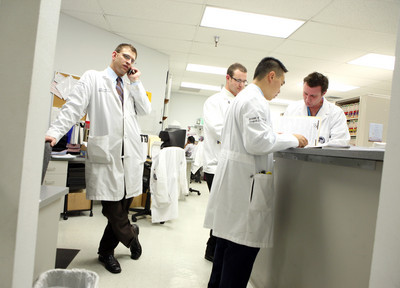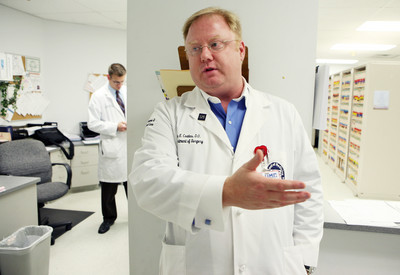More surgeons needed — stat!
Knife and bullet wounds go to trauma surgeons.
Gallbladders and ruptured appendixes are for general surgeons.
The critical care surgeons get the critically ill.
But what happens if someone is brought into the emergency room with skin torn off a hand and tendons exposed, if there's a patient with an injury to the neck or spine requiring emergency surgery?
In those cases, the on-call orthopedic surgeon, plastic surgeon or neurosurgeon is called.
But in Las Vegas, which has a shortage of sub-specialty surgeons, there could be a delay in treatment.
In an effort to expand the expertise of trauma, general and critical care surgeons so that they can handle all emergency surgery procedures, the University of Nevada School of Medicine has started the nation's first approved acute care surgery fellowship program.
"The concept is to train surgeons to manage all surgical emergencies," said Dr. Gregory Jurkovich, chairman of the Acute Care Surgery Committee of the American Association for the Surgery of Trauma. The committee oversees the development of such programs in the United States.
Jurkovich said about 20 other acute care surgery fellowship programs are in the works in the United States.
"Nevada started first," he said.
The medical school already offered fellowships in surgical critical care, which includes trauma. Those fellows, and the acute care surgery fellows, train at University Medical Center, which is home to the area's only Level I trauma unit.
UMC, Clark County's only public hospital, handles more than 6,500 surgical procedures a year in all surgical specialties. Most of those surgeries are assisted by surgeons who are taking part in training programs through the medical school.
Dr. Jay Coates, assistant director of the medical school's surgical critical care fellowship, said there is a big push in medicine to increase the surgeon population in the United States.
He said surgeons are getting older, as is the general population, and that means greater need for more surgeons. The need will be most felt in emergency rooms.
"The biggest problem we have is that we lack adequate surgeons in sub-specialties and general surgery," Coates said. "Oftentimes our trauma surgeons are sent into the emergency room to help out. Our trauma surgeons are way too busy for appendixes. UMC's trauma unit is one of the busiest in the United States.''
Dr. William Zamboni, chairman of the medical school's Department of Surgery, said there can be delays in surgeries if a sub-specialist isn't available.
The acute care surgery fellowship, which will train two fellows each year, will train surgeons who can assist the sub-specialist surgeon by initially stabilizing the patient or by doing the surgery themselves.
"It's going to be nice having the experience," said Dr. Scott Cinelli, one of the two fellows in the acute care surgery fellowship program. "Depending on the state the surgeon ends up working, this will definitely be useful because some states lack surgeons in certain sub-specialties."
Though there's no guarantee fellows will remain in Nevada when they've completed their one-year training in the program, Zamboni said, there are benefits that go with the notoriety of being the first in the nation to have such a program.
The program is expected to draw the interest of other surgeons who will want to participate. Also, UMC will have two additional physicians at the hospital for a year to assist with a variety of patient needs.
Contact reporter Annette Wells at awells@reviewjournal.com or 702-383-0283.


















